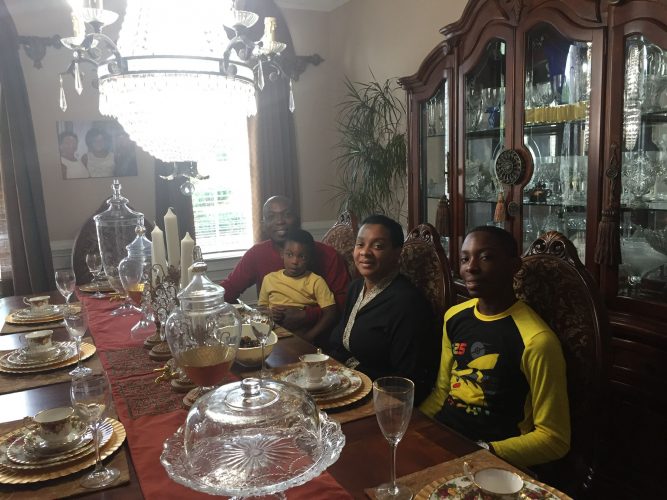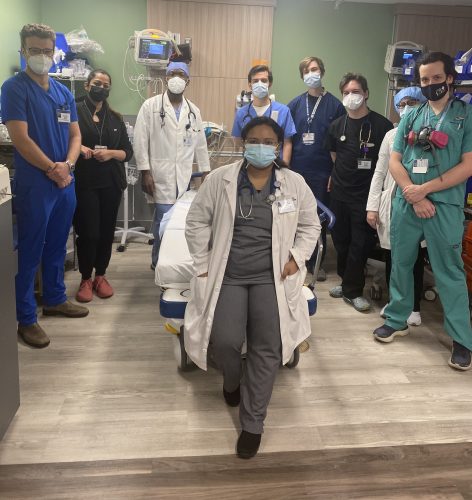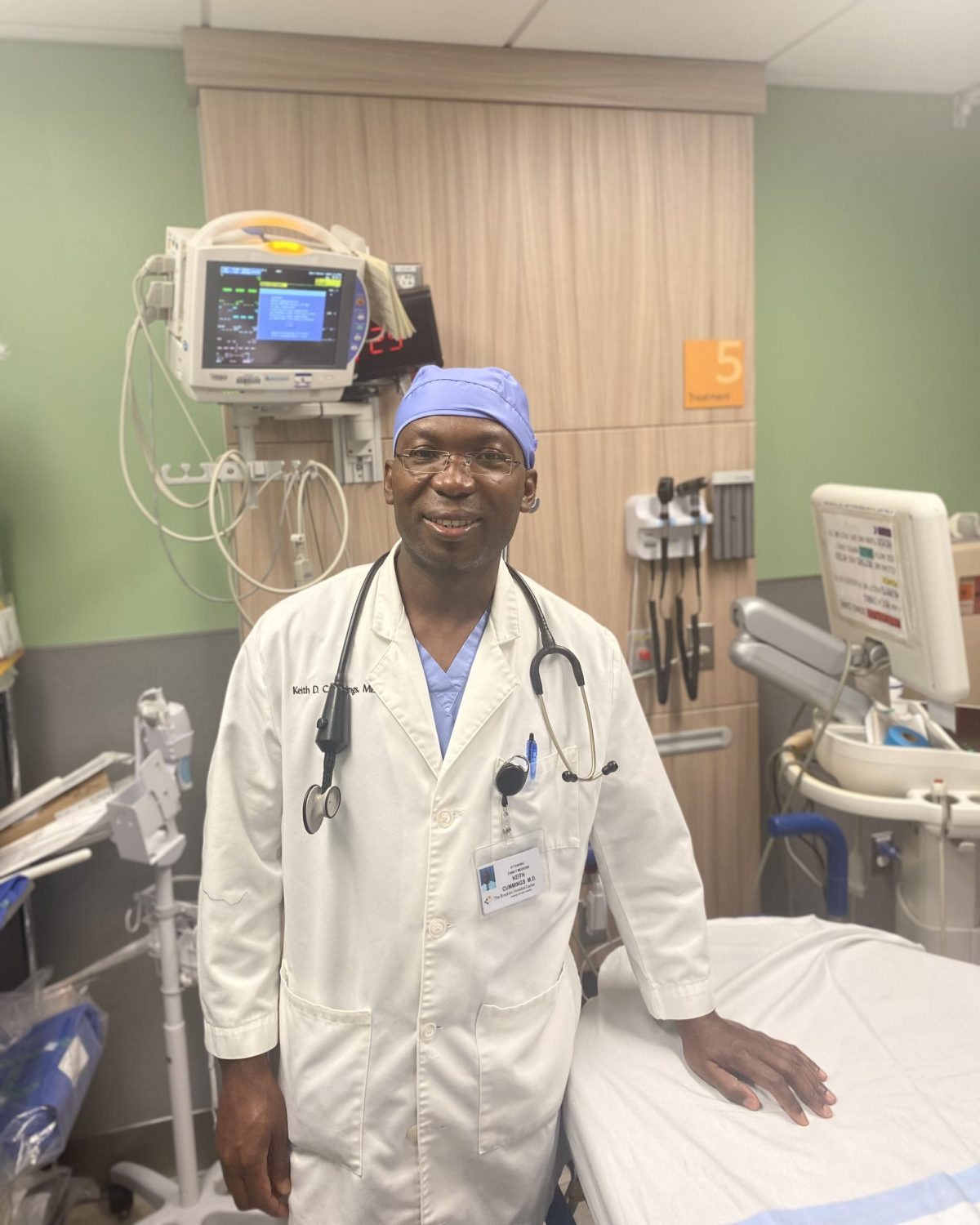When COVID-19 hit the United States, New York City was considered the epicentre of the disease. Thousands of people succumbed to the virus and as health officials waged a sometimes seemingly futile battle, Dr Keith Cummings, sometimes suited up in “basically plastic bags,” was at the forefront caring for hospitalised patients and even those who were in their homes.
He lost some of the patients and he cried as there were times when he felt hopeless but Dr Cummings, a son of Guyana’s soil, did not give up as he knew his expertise was needed. Over the last few years, he has not only treated people in the US but he has done so in Guyana and other parts of the world, some by consultation from afar, and as time progressed he has seen more and more victories.
“I feel as if this is my purpose. I have a purpose-driven mind to impact people in health and wellness. That is my purpose in life,” Dr Cummings said when asked what drove him when many others were afraid.


He described the initial fight with the virus as “building a ship and sailing at the same time” as numerous forms of therapies were tried and when some started to fail he said it really impacted him.
“Once I began to lose people that I became attached to, it became personal. [It felt] like I was losing…,” he said. He recalled that he resuscitated a 76-year-old woman one morning and she was very thankful but he got a big shock “the next morning when I came back the lady was wrapped and sent to the morgue.
“The next day she died so I actually kind of broke down with that, I actually cried…”
Dr Cummings recalled crying for a staff member at the hospital who hailed from Grenada and worked in the canteen. The 48-year-old said it became even more difficult as they were scared to touch patients for long periods; they were still learning and treatments were failing.
Dr Cummings, who is an Associate Professor of Family Medicine at St George’s University School of Medicine and an attending physician at the Brooklyn Hospital Center, has to date personally treated over 3,000 patients with zero deaths from a protocol he personally developed.
During 2020, when the pandemic raged in New York, Dr Cummings, who was away from his young family, sacrificed immensely to save lives, seeing hundreds of hospitalised patients. But when the hospitals became overcrowded, he suited up and bravely visited homes to treat stricken persons.
“The entire pandemic from day one to now I have seen thousands of patients across the world. I have travelled to several places… and most importantly I not only see patients in hospitals [but] I also do teleconferences, telemedicine…,” Dr Cummings said in a recent interview with this newspaper.
At the outset of the pandemic, Dr Cummings witnessed about 12 to 15 patients dying in one day.
“Never in my history have I seen patients die just one after the other but that is what we were seeing because New York was the epicentre,” he said, before adding that at that time he felt emboldened to work more and do more. There were times when he worked 14 days straight.
He said he does not employ only traditional medicine but combines evidence-based medicine with homoeopathic medicine. He has a background in pharmacy as a former graduate of the University of Guyana (UG) pharmacy programme. He noted that he employs a series of herbs that originate from plants found locally (such as lemongrass and dandelion) that he believes can prevent people from becoming hospitalised.
Holistic and spiritual
Dr Cummings now lives between New York and Georgia. He does a lot of community service in Brooklyn and Queens and said he was emboldened to join the fight to manage COVID because naturally he has a holistic/spiritual will to do good for humankind. That was the reason for him transitioning from pharmacy to medicine and becoming a teaching physician.
During the days when COVID raged Dr Cummings said he visited the homes of many Caribbean nationals because there were too many sick people who could not be admitted to the overrun hospital; there was not enough space to accommodate them. Persons were told to only visit hospitals if they had severe shortness of breath and were really sick.
He advocates wearing the right kind of mask—the N95—in order for persons to protect themselves from virus. According to him, washing one’s hands will not help since the virus is respiratory.
With many people still dying, Dr Cummings believes the biggest challenge remains behaviour modification which he believes could end the pandemic. This includes having mask wearing vigorously enforced as well as social distancing. He also recognizes the need for equitable distribution of the diagnostics as it relates to the testing. He believes the lack of adequate and equitable distribution of testing is one of the things that has prolonged the pandemic.
Vaccination, he also said, plays an important role in fighting the virus along with adequate distribution of evidence-based treatment that is working.
Once a person has confirmed that they have the virus, Dr Cummings advises that they excessively hydrate because if they don’t, then their kidneys can shut down, which creates other problems because if your body cannot get rid of toxins then it affects your metabolism. He also recommended that positive persons put themselves on a high dose of Vitamin C while the “gold standard and the best supplement” is Vitamin D3.
But Dr Cummings said he has long since suspected and as has been confirmed by the SHADE Study, published in the British Journal Medicine, the dose of Vitamin D3 that is being used in the hospitals is too small.
He said the dose that is being used is a “Mickey Mouse dose” as it is negligible and does nothing and he likened it to going into a storm with an umbrella. He recommends 50,000 international units of the vitamin D3 for the first five days.
“I find there is a significant difference in the people I care for out of the hospital when I give them fifty thousand…daily for the first five days. It transforms the infection, it decreases the amount of inflammation that is going on in your body,” Dr Cummings stated.
He pointed out that the COVID infection causes a hyper inflammatory state and as such there are a lot of inflammatory chemicals in an infected person’s body trying to get into their cells. Once they are in the cells they make the cells produce a lot of toxins and when that is done the lungs and nerves are damaged and the person gets diarrhoea, and loses their smell and taste. A high dose of vitamin D3 blocks this from happening for five to seven days.
He said he has been recommending this way before the SHADE publication and has seen remarkable results as he cared for “thousands of patients by in person or by advice across the world”.
Locally, Dr Cummings said he has saved the lives of many Guyanese and he has visited three times since the pandemic.
Dr Cummings’ wife is a research scientist and she and their two young sons are domiciled in Georgia and as such during the pandemic he has been away from his family for long periods but he said it panned out well in the end. Initially, he had aimed to move his family to New York when he got a new job but the pandemic came and his wife got into the research doctoral programme, “so it worked out well that I didn’t have to mix with them too much”.
A dream fulfilled
About his journey to becoming a doctor, Dr Cummings said it was his dream since he was in primary school. Raised in Corentyne Berbice, he said he enjoyed science projects in school and that stimulated his interest but initially it was not easy to get into medical school so he studied pharmacy.
After graduating he worked in St Kitts and Nevis as a pharmacist then later returned to Guyana to study medicine. Following this, he moved to Grenada, where he taught at the St George’s University School of Medicine and later wrote the US medical licensing examination and migrated to the US.
While he has not formally worked in his homeland, Dr Cummings said he has been giving of his service whenever he can and currently he is about to execute what he described as a big project where he is procuring items which would be shipped through the Red Cross that will then distribute them to various health institutions.
He said his move to execute the project was because of what he saw in a local health institution which is akin to operating in the 1930s. The project is supported by the Linden Fund and other organisations and individuals.
Dr Cummings left Guyana in 2004 but he always has his home country at heart and said he will continue to contribute wherever possible.






